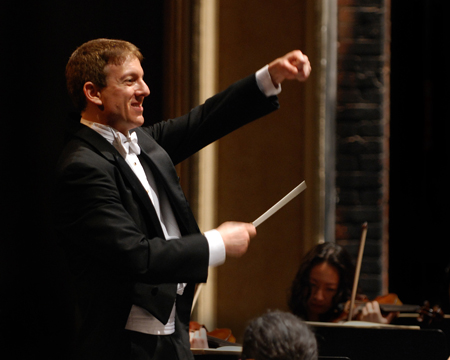
The Joffrey Ballet’s American Legends series is coming up at The Auditorium Theatre in Chicago, and this mixed repertory program will feature live music with the Chicago Philharmonic. We wanted to learn more about the process of what goes on behind the scenes to bring this partnership between dance and music to life, so we reached out to Scott Speck, Music Director for the Joffrey. He shares some insights here about how the program has taken shape, as well as what life is like for him during the process…
How far in advance will you arrive prior to conducting for the Joffrey’s American Legends performance series at the Auditorium Theatre—and where will you stay while you are in town?
Well, although I regularly conduct symphony orchestras around the country (including the Mobile Symphony and West Michigan Symphony, where I’m Music Director), I should tell you that I am a part-time Chicagoan. Chicago is one of my home bases, and I have a beautiful apartment overlooking Millennium Park. It’s a four block walk in one direction to the Joffrey Studios, and a four block walk in the other direction to the Auditorium Theatre, where the Joffrey Ballet performs. Couldn’t be more convenient!
The Joffrey Ballet usually begins rehearsal for all the season’s programs during the previous summer, so I spend several weeks during the summer in the studios, learning to understand the dancers’ needs and the choreographers’ vision. For the upcoming American Legends, some of the ballets were also rehearsed throughout the fall. One of the ballets, Stanton Welch’s Son of Chamber Symphony (set to the music of John Adams), was performed several times during the company’s most recent national tour — and most recently, I conducted it for them with the LA Opera Orchestra at the Los Angeles Music Center. So I am very familiar with all of these works by the time I show up to conduct for them in Chicago.
What type of advance preparation do you do before your arrival?
First and foremost, I learn the music as music, rather than as accompaniment. Since the vast majority of my experience is as a symphonic conductor, I have developed ways of analyzing and internalizing a score that work for me. Of course, some pieces are much more complicated than others. In some cases, preparation means starting to learn a score a year in advance. And in other cases — for example, Stravinsky’s Rite of Spring — I’ve been studying the music on and off for 20 years!
Once I know the musical score inside and out, it’s time to learn what the choreographer has been inspired to do with it. It’s fun to see how a certain melody or sonority gets translated into movements of the bodies onstage.
Tempo is a very important consideration. The choreographer usually has a particular tempo range in mind when he or she sets a work. Sometimes, as in John Adams Son of Chamber Symphony, the music has a steady motor rhythm with very little leeway for tempo changes — so that no matter what the dancers are doing, the music has to go a certain way. But in other pieces, such as Gerald Arpino’s Sea Shadow (set to Ravel’s Piano Concerto in G), there is room for plenty of ebb and flow, give and take, going faster and slower. Especially in pieces like this, I try to understand exactly what the dancers need to do on each beat, and where they need time to breathe. My goal is to be true to the intent of the music while simultaneously supporting the dancers and allowing them to do their best.
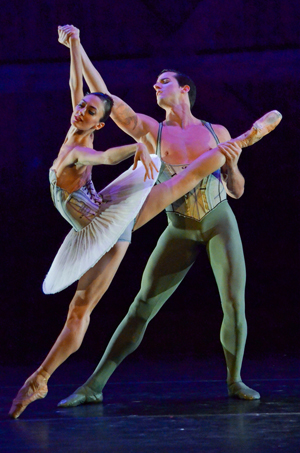
Once you are in town, what is does your schedule look like in terms of rehearsing/meeting with Joffrey, etc.?
At the Joffrey studio, almost all rehearsals take place between 11:30 am and 5:30 pm. So when I’m in town, I plan to be in the studio for most of that time. That gives me the morning for exercise, Bikram yoga (my biggest hobby), writing emails, and taking care of other orchestra business, and the evening for studying scores and then unwinding, alone or with friends. We performers tend to be late-to-bed, late-to-rise types. Breakfast? What breakfast? But I’ve had some great dinners at 1 am.
Performance days are different — especially Saturdays, when we usually do two shows. Then the performance dominates the day, and I plan everything around it. I’ll usually get plenty of sleep, maybe exercise in the morning, do mindless stuff for a few hours, eat a big high-energy meal a few hours before the show, take a short power nap, and then spend a couple of hours getting into the right head space for performance. I once asked a Broadway performer, who had been in Les Miserables on Broadway for several years, what time each day he started thinking about the show and getting into character. His answer was, “When the curtain goes up.” I couldn’t be more different — not at this point, anyway! I’m living the music for a couple of hours before I get on the podium to conduct. But after the show, the rest of the night is mine. That’s one reason I like to stay up late!
What is it like to work with Ashley Wheater and the dancers?
Ashley Wheater is a truly great Artistic Director, with a very clear creative vision for the company. He knows what he’s aiming for, and he knows how to make it happen. He has already brought the company to a new level, recognized throughout the world. My primary role at the Joffrey is to support this vision and give it a brilliant soundtrack.
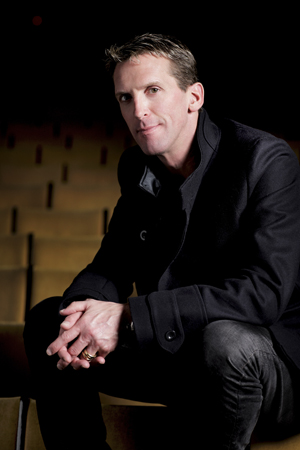
Ashley is extremely musical, more so than just about any other Artistic Director I have ever met in the field of ballet. I am gratified to be working with a leader who values the great musical tradition so highly. And having concentrated my conducting career on the great symphonic masterworks, I truly have a foot in each world — I feel that I can offer our company an enhanced perspective on the music that accompanies ballet. Ideally, the music is a full partner to the dance. In so many companies the music falls by the wayside. Here, I am doing everything I can to ensure that we eventually have live music for every performance. What a pleasure it is to know that this is Ashley’s vision as well. Despite the extraordinary expense, Ashley has gone to the mat for live music, because it’s the right thing to do. (More on working with the dancers below!)
How do you prepare the Chicago Philharmonic to work with Joffrey?
We concentrate on the music first, just as I do when I’m studying the scores. The Chicago Philharmonic is a finely-tuned instrument, truly a stunningly good orchestra. The musicians are already very well-versed in listening to each other and reacting in real time. So first we prepare the music as if we were going to perform it in an orchestral concert. This is extraordinarily gratifying to us, even when we perform underground in the orchestra pit.
What makes this work unique is that we know that while we’re playing, there are 42 virtuoso athletes dancing above our heads. It’s a fine balance, and it works best when the musicians and I truly appreciate the intricacies of the dance, and the dancers appreciate the intricacies of the music. In orchestra rehearsals I often tell the musicians exactly what is happening onstage so that they can imagine the movement as they are accompanying it. And in the studio, I often help individual dancers to understand how they are embodying a musical phrase. In performance, of course, my job is to act as a conduit between the two. I’m the only person in the theater who can see all the musicians and all the dancers at once. When a dancer makes a leap, my baton follows the same arc as the dancer’s body, landing at the same instant so that the music can connect exactly.
But there’s something more. In an ideal performance, there is a marvelous creative spirit that infuses the dancers, the musicians and me simultaneously. We are not so much reacting to each other as sharing equally in this communal spirit. This is something I feel in the best symphonic performances as well. We’re not making music — the music is making us.
Do you have any places you especially enjoy going in Chicago when you are in town?
Since I live right by Millennium Park, I love hanging out there. I don’t know of a better park in the world. During the summer there are free concerts nearly every night, and fireworks all year long. I also love getting to know the incredibly diverse neighborhoods in Chicago, and especially their restaurants. I’m currently in love with the Vietnamese food near the Argyle stop on the Red Line.
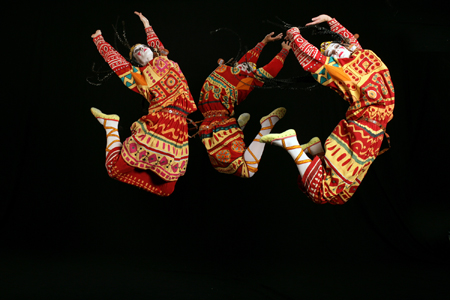
Not all your work with Joffrey is in Chicago. What is it like to work with them on tour?
Intense! We just came back from a fantastic set of performances at the Dorothy Chandler Pavilion in Los Angeles. The highlight of the program was Stravinsky’s The Rite of Spring, with a brilliant reconstruction of Nijinsky’s original choreography by Millicent Hodson and Kenneth Archer. We had three highly-charged, sold-out performances, and I’ve almost never seen such a rapturous response to ballet. The Joffrey Ballet is one of the world’s great companies, and it’s on tour that they find out how much they are appreciated around the world. What a pleasure to be a part of that.
American Legends runs from February 13th through February 24th at Chicago’s Auditorium Theatre
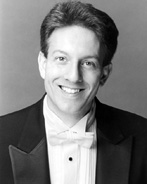
With recent performances in London, Paris, Moscow, Beijing, Chicago, San Francisco and Washington, Contributor Scott Speck has inspired international acclaim as a conductor of passion, intelligence and winning personality.
Scott Speck’s recent concerts with the Moscow RTV Symphony Orchestra in Tchaikovsky Hall garnered unanimous praise. His gala performances with Yo-Yo Ma, Itzhak Perlman, Joshua Bell, Midori, Evelyn Glennie and Olga Kern have highlighted his recent and current seasons as Music Director of the Mobile Symphony. This season he also collaborates intensively with Carnegie Hall for the seventh time as Music Director of the West Michigan Symphony. He was recently named Music Director of the Joffrey Ballet; and he was invited to the White House as Music Director of the Washington Ballet.
In recent seasons Scott Speck has conducted at London’s Royal Opera House at Covent Garden, the Paris Opera, Washington’s Kennedy Center, San Francisco’s War Memorial Opera House, and the Los Angeles Music Center. He has led numerous performances with the symphony orchestras of Baltimore, Houston, Chicago (Sinfonietta), Paris, Moscow, Shanghai, Beijing, Vancouver, Romania, Slovakia, Buffalo, Columbus (OH), Honolulu, Louisville, New Orleans, Oregon, Rochester, Florida, and Virginia, among many others.
Previously he held positions as Conductor of the San Francisco Ballet; Music Advisor and Conductor of the Honolulu Symphony; and Associate Conductor of the Los Angeles Opera. During a recent tour of Asia he was named Principal Guest Conductor of the China Film Philharmonic in Beijing.
In addition, Scott Speck is the co-author of two of the world’s best-selling books on classical music for a popular audience, Classical Music for Dummies and Opera for Dummies. These books have received stellar reviews in both the national and international press and have garnered enthusiastic endorsements from major American orchestras. They have been translated into twenty languages and are available around the world. His third book in the series, Ballet for Dummies, was released to great acclaim as well.
Scott Speck has been a regular commentator on National Public Radio, the BBC, the Australian Broadcasting Corporation, and Voice of Russia, broadcast throughout the world. His writing has been featured in numerous magazines and journals.
Born in Boston, Scott Speck graduated summa cum laude from Yale University. There he founded and directed the Berkeley Chamber Orchestra, which continues to perform to this day. He was a Fulbright Scholar in Berlin, where he founded Concerto Grosso Berlin, an orchestra dedicated to the performances of Baroque and Classical music in a historically informed style. He received his Master’s Degree with highest honors from the University of Southern California, served as a Conducting Fellow at the Aspen School of Music, and studied at the Tanglewood Music Center. He is fluent in English, German and French, has a diploma in Italian, speaks Spanish and has a reading knowledge of Russian.
Scott Speck can be reached at www.scottspeck.org




